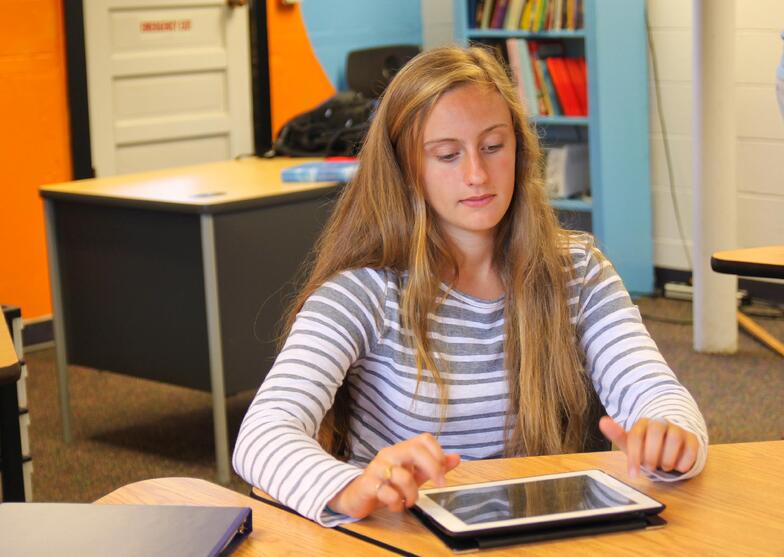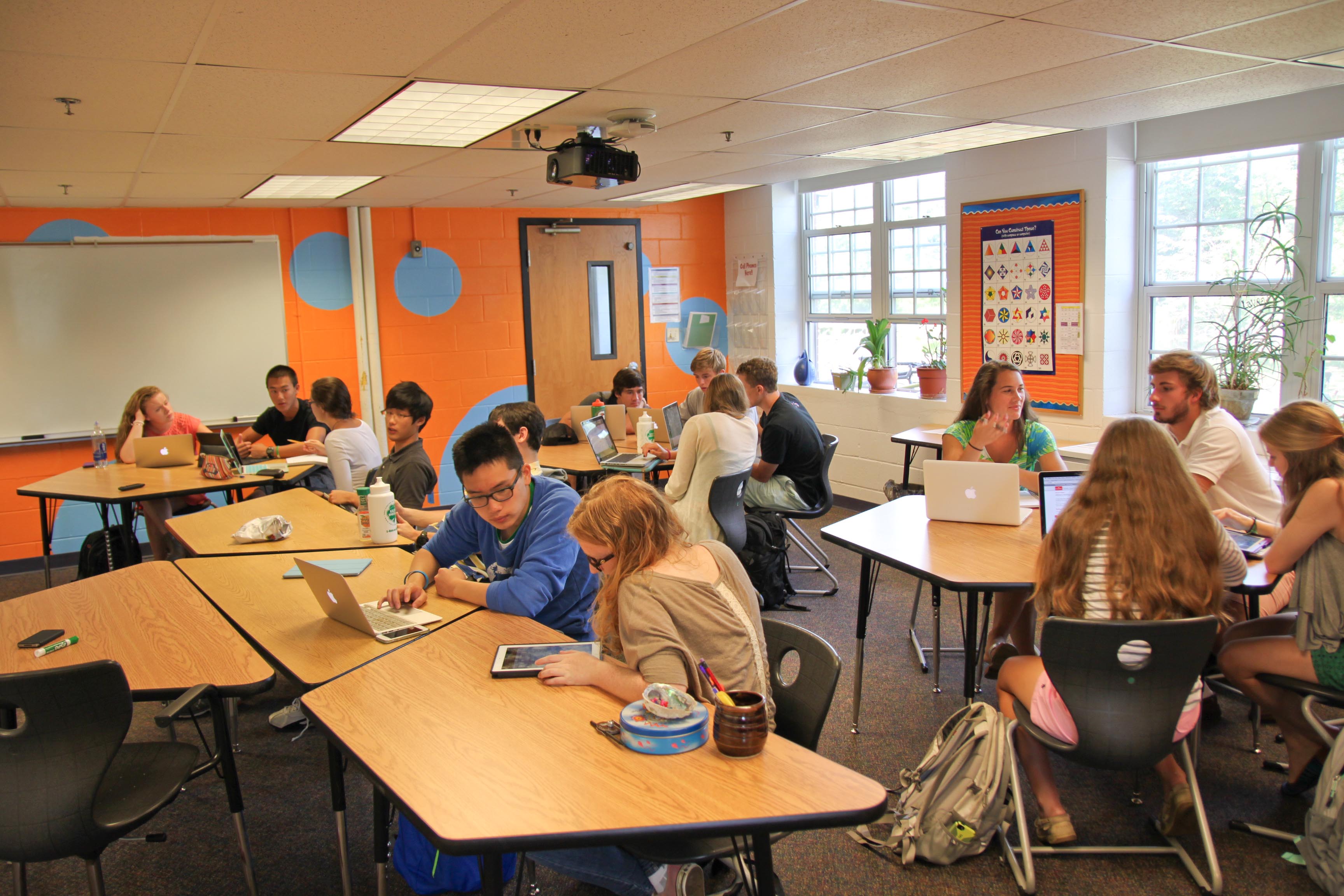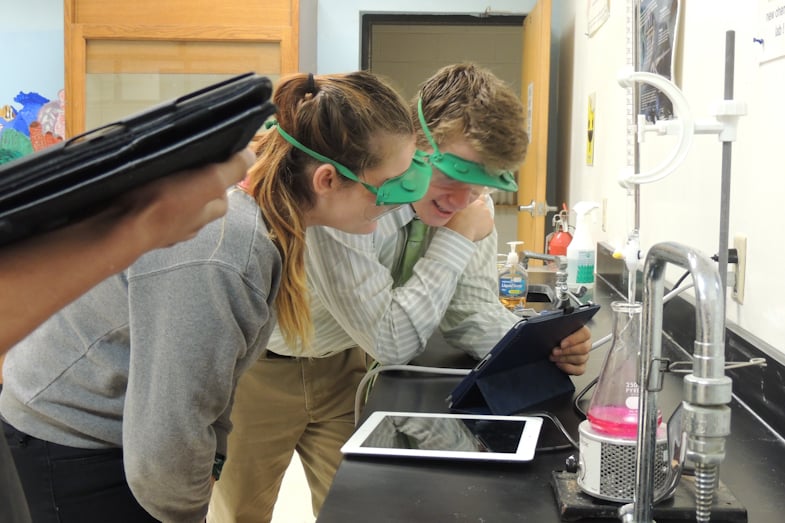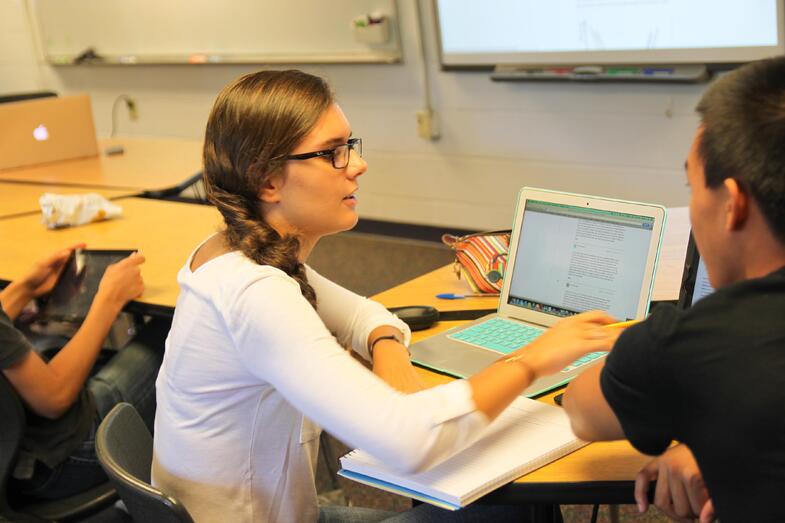As a school that pioneered a 1:1 laptop program in 2001 and initiated a 1:1 iPad program last year, technology is certainly not new to Proctor's classrooms, nor is it going to leave our classrooms anytime soon. Central to our technology integration strategy is utilizing technology as “A” problem solving tool, not “THE” problem solving tool.

One of the biggest transitions students make from Wilderness Orientation to the classroom involves use of technology. Last week we discussed the merits of technology-free hiking in this post. Dean of Faculty Karl Methven recently shared this Slate.com article by Annie Paul Murphy, Get Tech Out of Schools. Her premise is students interact enough with technology outside of the classroom, why bring it in? She presents the statistic that in the United States 1,000 hours of instructional time are required of students in schools, however, the average 8-18 year old absorbs more than 4,000 hours a year from a digital device. Patricia Greenfield counters there is much learning that takes place via technology outside of the classroom - worth the read if you have time!

This year, Proctor added a new faculty position (Technology Integration Specialist) with the understanding significant time, energy, and intentionality around technology integration is essential to keeping Proctor current in the ever-changing world of technolgy. Adam Jones steps into this role as he seeks bring the ever-changing world of educational technology closer to Proctor’s classrooms. Proctor’s commitment to this new position provides teachers the opportunity to:
-
Collaborate in an Educational Technology Strategy group that will explore the long-term vision around technology integration at Proctor.
-
Access one-on-one coaching around technology integration
-
Utilize and bolster an online Resource Board for teachers.
-
Have ongoing professional development training in educational technology available.
-
Know we have an in-house expert in the field of educational technology able to visit classes and work with teachers to ensure our classrooms remain innovative.

Education Week published this article by Frank LaBanca, the Director of 21st Century Skills at Education Connection, a while ago. LaBanca’s main point: just because you have innovative technology doesn't mean you are instructionally innovative.
As you read our blogs over the course of a year, you will hopefully get a clear picture of our educational model at Proctor. We believe firmly in our experiential approach to teaching content, both on campus and through off-campus programs. We also believe teaching 21st century skills like information literacy, collaboration, communication, problem solving, responsible citizenship and creativity is critical. Our conclusion as a community is that the integration of new technologies has the potential to augment hands-on learning experiences available to our students.

LeBanca writes, "Just because the technology is innovative doesn't mean the instructional approach to using it is…when we retrofit technology, we rarely change the paradigm.” Lastly, he notes, "The real question, ultimately, is 'Does technology help our students become better independent, self-directed learners?' That's the game changer. It's not about the latest fancy device, hot off the shelf. That device is just a tool--it's not knowledge and it's not a skill."
The instructional innovation LeBanca writes of is already happening this fall in Proctor's classes:
-
Chemistry students in Sue Houston’s classes use Notability for lab reports.
-
Social Science classes using Twitter in three ways: archive of notes, ideas and insights using hashtags (#jonesclass as one example), as a research tool for current events, and real-life organizational research, and as a way to reach out to experts in the field.
-
Algebra and Geometry students in Lindsay Brown’s classes are able to access Livestream replays of class in the evenings or in case they miss class.
-
Jen Summers is using Livestream in her Acting class to archive student work over the course of the term.
-
Social Science students in Brenda Godwin’s Middle Eastern studies course are utilizing a class Wiki to collaborate on resources, notes, and presentations.
-
Teachers across departments are using blogs as a way to have ongoing, asynchronous discussions. Here is just one example. And another. And one more!
-
Teachers across departments, including Alan McIntyre, are using Socrative, Poll Everywhere and other apps to check in real time student learning and engagement.
While we must look no further than our Ocean Classroom and Mountain Classroom programs for evidence that transformative learning can take place without technology present, technology absolutely serves as an effective tool in pursuit of Proctor’s educational goals. Exciting things are happening around educational technology at Proctor. Come visit a class this fall to see for yourself!







